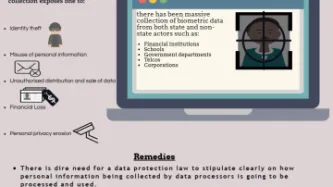Search
Content type: News & Analysis
Privacy International welcomes the judgment of the European Court of Human Rights in Catt v the United Kingdom.The Court found that the UK violated the right to privacy (Article 8 of the European Convention on Human Rights) of Mr John Catt, a peace movement activist, who despite having never being convicted of any offence, had his name and other personal data included in a police database known as the “Extremism Database”. The Court found problematic "the variety of definitions of…
Content type: State of Privacy
Table of contents
Introduction
Right to Privacy
Communication Surveillance
Data Protection
Identification Schemes
Policies and Sectoral Initiatives
Introduction
Acknowledgement
The State of Privacy in Argentina is the result of an ongoing collaboration by Privacy International and Asociación por los Derechos Civiles (ADC).
Key Privacy Facts
1. Constitutional privacy protections: While Argentina's constitution does not mention the word 'privacy', Section 19 has been taken by the…
Content type: News & Analysis
On 22 January 2019 Google updated its Terms of Service and Privacy Policy for Europe.
The message is quite reassuring:
“Nothing about your experience in Google services will change. And nothing is changing in terms of your privacy settings, the way your data is processed, nor the purposes of its processing”.
Then it says: “However, if you don’t want to accept these changes in our terms and Privacy Policy, you can choose to stop using the applicable services.”
Simple. If you don’t like it,…
Content type: News & Analysis
We found this image here.
In order for GDPR to be effective at protecting people's data, it must be implemented and enforced. Therefore, we are pleased to see that CNIL has taken action and issued Google a fine of €50 million based on complaints by NOYB and La Quadrature Du Net in May 2018. Despite numerous statements by Google that it takes the protection of people's data seriously, the decision demonstrates that they have a long way to go and that regulators will take action to hold…
Content type: News & Analysis
Federal law enforcement is deploying powerful computer hacking tools to conduct domestic criminal and immigration investigations.
By Alex Betschen, Student Attorney, Civil Liberties & Transparency Clinic, University at Buffalo School of Law
Hacking by the government raises grave privacy concerns, creating surveillance possibilities that were previously the stuff of science fiction. It also poses a security risk, because hacking takes advantage of unpatched vulnerabilities in our…
Content type: Press release
FOR IMMEDIATE RELEASE
December 21, 2018
CONTACTS:
Alex Betschen, Civil Liberties & Transparency Clinic, [email protected], 716–531–6649
Colton Kells, Civil Liberties & Transparency Clinic, [email protected], 585–766–5119
Abdullah Hasan, ACLU, [email protected], 646–905–8879
NEW YORK — Privacy International, the American Civil Liberties Union, and the Civil Liberties & Transparency Clinic of the University at Buffalo School of Law filed a lawsuit today…
Content type: News & Analysis
Photo credit: US Immigration and Customs Enforcement
The trial of Mexican drug lord Joaquin “El Chapo” Guzman started in New York back in November 2018. But last week, the jurors were presented with a trove of new key evidence: dozens of text messages exchanged between Guzman, his wife, and his mistresses.
The reason behind this set of revelations? Guzman had been spying on his wife and mistresses, using publicly-available surveillance software called FlexiSpy. Once installed on his targets…
Content type: Explainer
Photo credit: warrenski
Mandatory SIM card registration eradicates the potential for anonymity of communications, enables location-tracking, and simplifies communications surveillance and interception. By facilitating the creation of an extensive database of user information, it places individuals at risk of being tracked or targeted, and having their private information misused. In the absence of comprehensive data protection legislation and judicial oversight, SIM users' information can be…
Content type: News & Analysis
This post was written by PI Technologist Ed Geraghty.
At the very heart of ThornSec’s design is that we assume our security will fail. There is nothing perfect on this earth (except kittens). The entire point is to fail well. For charities and NGOs that are fragile, poorly resourced, and often at risk, this is relatively novel thinking. We prepare for that with a strict adherence to good security practice.
It is exactly this element of novelty that makes us more open than your…
Content type: News & Analysis
This post was written by PI Policy Officer Lucy Purdon.
In 1956, US Presidential hopeful Adlai Stevenson remarked that the hardest part of any political campaign is how to win without proving you are unworthy of winning. Political campaigning has always been a messy affair and now the online space is where elections are truly won and lost. Highly targeted campaign messages and adverts flood online searches and social media feeds. Click, share, repeat; this is what political engagement looks…
Content type: Advocacy
Privacy International's comments to the Article 29 Working Party Guidelines on automated individual decision-making and profiling are here.
Content type: News & Analysis
We work to collect the minimum amount of data that we need from you to do our jobs within the resources we have, and to protect and use that data in an ethical manner. We are expanding the ways we engage with our supporters, by rebuilding our tech services to ensure that we continue to live up to that commitment.
Here we explain what data we have access to, what we collect, and how we work to protect your data. This piece is more explanatory than our policy statement which is available here.…
Content type: News & Analysis
Overview
CIPIT is currently investigating how the privacy of Kenyan citizens was affected by the use of biometric data during the just concluded 2017 general and repeat elections. The IEBC is mandated by law to register voters, verify their registration details and conduct elections. Accordingly, the IEBC is the custodian of the public voter register. There have been reports that individuals received SMS texts from candidates vying for various political seats during the campaign period of the…
Content type: Advocacy
This briefing consolidates Privacy International's concerns on the UK Data Protection Bill as it reached Report Stage in the House of Lords.
Content type: Long Read
The battle for Kenyan voters’ allegiance in the 2017 Presidential election was fought on social media and the blogosphere. Paid advertisements for two mysterious, anonymous sites in particular started to dominate Google searches for dozens of election-related terms in the months leading up to the vote. All linked back to either “The Real Raila”, a virulent attack campaign against presidential hopeful Raila Odinga, or Uhuru for Us, a site showcasing President Uhuru Kenyatta’s accomplishments. As…
Content type: Long Read
Introduction
Why We Are So Concerned about Government Hacking for Surveillance
Scope of Our Safeguards
1. Legality
2. Security and Integrity of Systems
3. Necessity and Proportionality
4. Judicial Authorisation
5. Integrity of information
6. Notification
7. Destruction and Return of Data
8. Oversight and Transparency
9. Extraterritoriality
10. Effective Remedy
Commentary on each
1. Legality
2. Security and Integrity of Systems
3. Necessity and Proportionality
4.…
Content type: Press release
A new investigation published today by Privacy International reveals the role of an American data-based digital advertising company in the highly divisive online re-election campaign of Kenyan president Uhuru Kenyatta.
In the run-up to Kenya's presidential election in August 2017, paid advertisements for two mysterious sites dominated Google searches for election-related terms and flooded Kenyans' social media feeds. All linked back to either 'The Real Raila', a virulent attack campaign…
Content type: People
Joanna Oniszk is our Resources Director. She joined us in 2015 to take on donor coordination and financial management of the organisation. She has over ten years of experience in variety of finance and management roles in corporate sector, international organisations and charities and holds an MA in Economics.
Content type: News & Analysis
Recently, a text from a local telecommunications company inquired whether its subscribers knew that they could now enroll their voice so they could access various services securely and conveniently. This added a further dynamic to the on-going debate in several quarters on the accelerated adoption of biometrics in Kenya. Does Kenya have the necessary framework in place to safeguard the privacy and security of its citizens? The reality is, innovators will not wait for an optimal…
Content type: People
Ed is a Senior Technologist at Privacy International. He is responsible for our technical security and research, and leads the development of our security framework and tech engagement with our International Network.
Content type: People
Caroline is Privacy International’s Legal Director and General Counsel. She leads the legal advocacy at PI and counsels PI’s programmes on legal strategy and risk. Caroline is a US-qualified lawyer who previously specialised in privacy and intellectual property litigation at a prominent US law firm. Caroline received her law degree from Yale Law School and her undergraduate degree in Anthropology from the University of California, Berkeley. After law school, Caroline…
Content type: People
Alexandrine is Directory of Strategy at Privacy International. She manages and oversees the development and delivery of Privacy International's strategic portfolio aimed at ensuring that innovative solutions serve individual and communities and protection their dignity rather than state power and corporate interest. This portfolio explores issues of digital identity, protecting communities at risk online, the digitisation of access to economic, social and cultural rights, and the use of data…
Content type: Report
When you rent a car at the airport, use a car-share for a family day trip, one of the first things you are likely to do before setting off on your journey, is to connect your phone to the car. You switch on the Bluetooth and see a list of other people’s phones that were previously connected - Mike’s iPhone, Samsung Galaxy, Bikerboy_Troi, Dee Dee. You input your journey into the navigation, perhaps noticing stored locations of previous drivers.
Seems fairly innocuous? Wrong. Your name and…
Content type: Press release
Press Release: New report shows how car rental companies are failing to protect drivers' information
A new report by Privacy International shows how car rental companies and car-share schemes are failing to protect drivers' personal information, such as their location, smart phone contents, and place of residence.
The report is here: https://privacyinternational.org/node/987
Key points
Privacy International (PI) rented a series of internet-connected cars and examined the information which was collected and retained on the rental cars' infotainment system*. Every car PI rented…

















